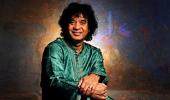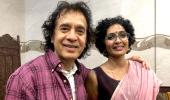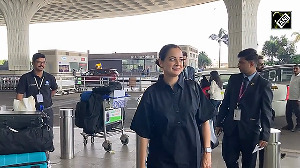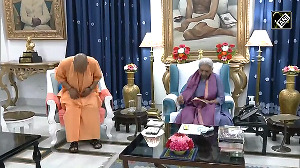Have you met Ustad Zakir Hussain?
Do you have a memory or an anecdote you would like to share with us?
Please mail getahead@rediff.co.in about your encounter with Ustadji and the impact he had on your life (Subject line: When I met Ustad Zakir Hussain).

To say that Ustad Zakir Hussain was a genius is an understatement.
To say that he was a savant would also be an understatement.
To say that Zakirbhai was popular would be an understatement.
To say that he had charisma would be a gross understatement.
Then how do you describe a person like him? A mystery? An enigma? A riddle?
He was an eternal romantic, a mystique, a story that will be told in a thousand ways by each person who met him, loved him, spent time with him, got to know him and shared some precious time off stage with him.
Zakir is actually derived from the Arabic word Dh’kir, meaning to remember. So that is exactly what I am going to do. To remember him and celebrate his memory.
Fortunately, my mother was a regular at all music conferences in Mumbai -- like the Gharana Sammelan, The Indian Music Group's annual festival which, in the early days, was co-branded as 'in association with Alla Rakha' and whose Jan Fest was held at Rang Bhavan (south Mumbai).
She was also on the organising committee of many of these events including the Gharana Sammelan which was supported by the Kilachand family and the Sawai Gandharva Music Festival. What this meant was that, when I went for concerts with her, I got access to the green rooms and artiste entrances at almost all the venues -- be it the Tejpal Auditorium, Rang Bhavan, Ravindra Natya Mandir, Shanmukhananda Hall or Birla Auditorium (all in Mumbai).
Naturally, after a while, the ushers would just wave and let you through.
The artistes also started recognising me as I would be frequently holding to mom's purse while she played the role of emcee or welcomed the artistes with garlands onstage.

When I enrolled at Xavier's College (south Mumbai), I was introduced to Fazal, Zakirbhai's younger brother, by one of my classmates.
From then on, visits to their home in Shimla House at Nepean Sea Road (south Mumbai) became a regular feature.
A hallmark of the warmth and bond that developed with the Qureshi family was the impromptu baithaks that they would have that would go on for two nights and three days sometimes.
"Arre Ghulam Ali (Khan) aaya hai, woh ab gaayenge. Baith jaa sab log. Eh Fazale, tabla le aa," Abbaji (Ustad Alla Rakha Khan Saheb), would say in his Punjabi Urdu accent.
The audience would include luminaries like Sitara Deviji, Pandit Shiv Kumar Sharmaji, Pandit Hari Prasad Chaurasiaji, Jagjit Singhji and a host of other artistes. One by one, each would come and sing, play, dance.
There would be short breaks for meals and refreshments and the music would continue... tabla solos, Kathak dances, santoor recitals and then, after two or three days, Ammaji would come and say "Tum sab ko ghar nahin jaana? Chalo, chalo, ab agli baar..."
By then, Zakirbhai had already become a highly established and respected name as an accompanist who by his sheer magic could lift the level of any performance.
He accompanied Pandit Jasrajji with the respectful restraint that a doyen deserves and literally 'played' those fantastic sawaal-jawaab games with Shiv Kumar Sharmaji and Hari Prasad Chaurasiaji.
He sat on stage like a student soaking in the nuances of the notes and the compositions when Pandit Ravi Shankarji played and revelled when keeping beat to the feet of Pandit Birju Maharajji.
Then came Shakti and boy! what a statement that was... John McLaughlin, L Shankar, Zakir Hussain and Vikku Vinayakram. That's where Zakirbhai truly showed that he was a genius par excellence, bridging the nuances of the music from the East and the West while remaining firmly rooted in Hindustani traditions and, if I may say for those familiar with the terminology, yeh chakradhar bhi kayde se.

I am not going to talk about his work in the later years -- it's all documented and easily available on social media -- but Zakirbhai was etched deeper in the pages of history pages when ITC sponsored an almost impossible coup by bringing estranged brothers-in-law Pandit Ravi Shankarji and Ustad Ali Akbar Khanji (Pandit Ravi Shankar was married to Ustad Ali Abkar Khan's sister, Annapurna Devi, from 1941 to 1982) to perform a series of jugalbandi concerts together in four cities. Accompanying them were who else but Ustad Alla Rakha and Ustad Zakir Hussain.
The Mumbai concert at the Shanmukhananda auditorium was a sell out and we, as part the entourage, sat on the stage and not only watched the concert but also kept beat theka during the entire programme.
What an honour that was!
A couple of years ago, Zakirbhai played a fusion percussion concert with couple of his students from different parts of the world on percussion instruments of their choice.
His youngest brother Taufiq Qureshi played the Djembe.
Someone from the audience asked Zakirbhai how it felt to hear traditional compositions performed on non-Indian instruments.
The Ustad, who has almost singlehandedly been responsible for impacting more musicians and music lovers in his life time and possibly even after, than any other artiste, replied, "I look at myself, my training, my learning, my instrument, my traditions like a shore.
"These waves come from different parts to get something from the shore. I teach them, they learn, they adopt, they adapt, they improvise and they flow back.
"I cannot hold on to the waves. They are free and we must let them go and do what gives them joy just as I do what gives me joy..."
I will always dh'kir the "Hey maan, how are you?"
Rest in beats, Zakirbhai.
Have you met Ustad Zakir Hussain? Do you have a memory or an anecdote you would like to share with us?
Please mail getahead@rediff.co.in about your encounter with Ustadji and the impact he had on your life (Subjectline: When I met Ustad Zakir Hussain).
If you have PICTURES with him, do share them as well. Don't forget to mention your NAME and WHERE YOU LIVE.











 © 2025
© 2025